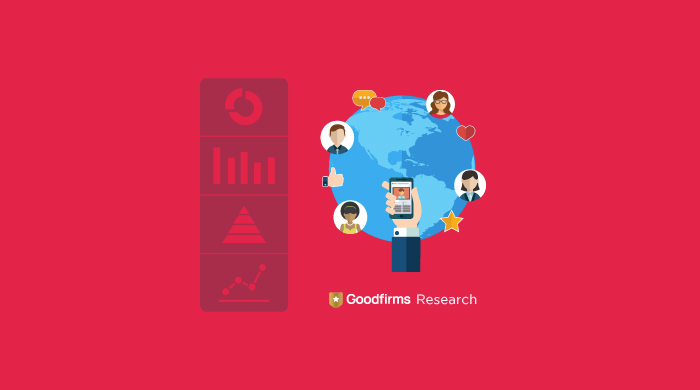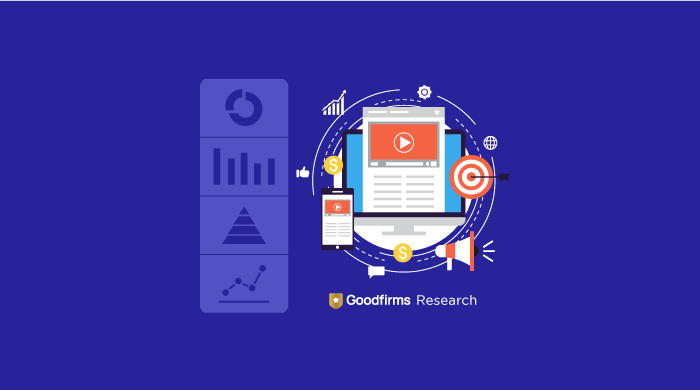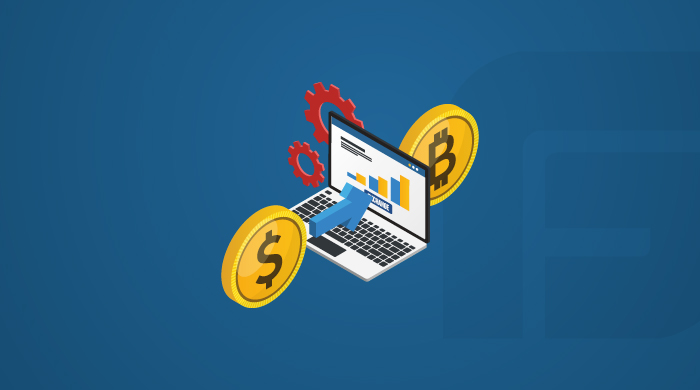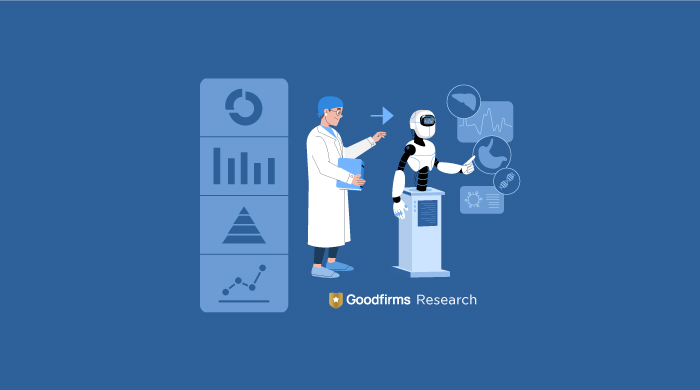Personalized marketing has become inevitable in the current scenario. It benefits a brand with an increase in conversion rates, sales, and engagement from the audience. Moreover, personalized marketing ensures that customers keep returning to the brand for future engagements. But, along with the benefits come the challenges. The availability of accurate data is one of the biggest challenges. While drawing the line between personalization and invading the personal space of customers would be another.
Personalized marketing, also known as one-to-one marketing, is a strategy by which brands display tailored content to their customers. It includes displaying engaging content, product recommendations, and specific offers on the basis of their browsing history, etc. Some of the best ways to successfully implement such a marketing strategy are creating an ideal customer persona, dividing them into groups of the same interest, and identifying their pain points. Brands can partner with experienced digital marketing companies to help them create an exceptional marketing campaign.
Marketing experts also suggest making the most of the data at hand for offering an exceptional experience to the customers. While there are many platforms to attract customers, email is hands down the best platform for a personalized marketing campaign. The primary reason being it has a substantial opening rate.
Goodfirms approached 50+ marketing experts around the world to get insights into personalized marketing and knowing what platform works best for implementing such a campaign.

Top Reasons To Use Personalized Marketing
Personalized marketing is a powerful tool if a brand uses it correctly. Brands that have been able to leverage the benefits are strongly in the favour of implementing it in the long term. As per marketing experts, some of the top benefits of individualized marketing are that it helps increase engagement rate, sales. Also, it contributes significantly to forming a better connection with the audience and making them loyal customers.
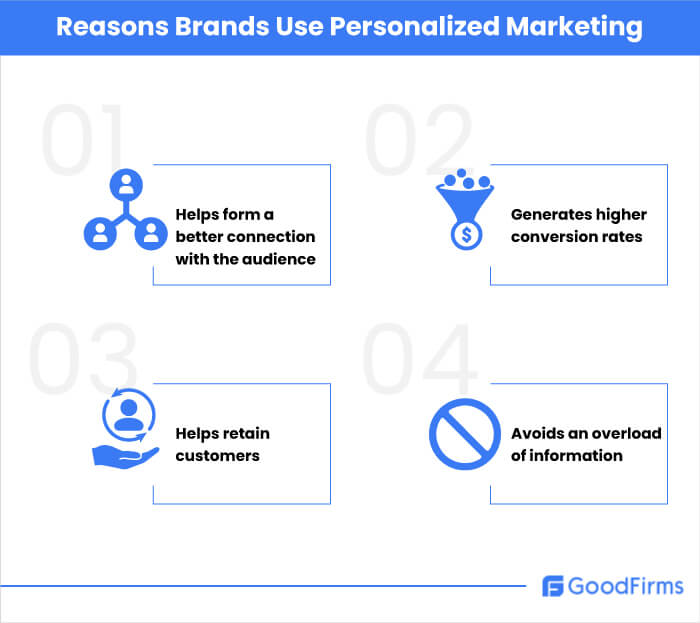
Helps Establish a Better Connection with The Audience
The audience will continue shopping from a brand only if they feel a certain connection with the brand. Another reason they will favor a brand is when they feel heard. Personalized marketing can help achieve that bond with the target audience.
According to David Finkelstein, CEO & Co-Founder of BDEX, personalized marketing can leave a lasting impression on the target audience as irrelevant ads can annoy them. In his words, “Personalized marketing is a much more impactful approach to connecting with your customer base. Data show that personalization leads to a five to eight times increase in ROI on marketing spend and can increase sales.”
Most consumers expect brands to have humane interactions with them. They expect the brands to hear and resolve their problems just like they would do for their near and dear ones. To make customers feel at home, personalized marketing can play a crucial role.
Can Give Higher Conversion Rates
The purpose of all marketing activities is to get business conversions and sales. Personalized marketing is no different.
Marketers recommend personalized marketing because doing so can keep the audience engaged, generate higher conversion rates, and effectively, increase sales.
Karl Robinson from Logicata explains precisely why personalized marketing is able to get higher conversion rates. He says, “Personalized marketing can be great to really create a successful conversion rate by targeting what consumers are more likely to buy from you, instead of hoping that they will buy into whatever you are selling.” Karl is the Co-founder & Director of Logicata.
Can Increase Customer Retention
Loyal customers are the ones that will help a business sustain itself in the competitive market and in the long run too. Due to this reason, it is inevitable for a business to have a loyal customer base. Marketers say that one of the important reasons brands should opt for personalized marketing is that it helps to retain customers and form a loyal audience.
The Managing Partner of Beaufort Associates, Mian Muneer Ud Din thinks that as personalized marketing uses the previous searching activities of customers to show further recommendations, it is an effective way to attract customers. Mian says, “Personalization allows businesses to deliver precisely what customers want and has the potential to enhance customer satisfaction and customer loyalty. Today, consumers expect personalized communications and get relevant offers and recommendations.”
Ferial Reynolds' perspective regarding personalized marketing is that it creates a customer base that knows the brand in and out and adores it too. Ferial said, “Businesses should use personalized marketing because it creates loyal fans of your business. It creates a 'tribe' of people who know your business, know your team, know your products, and who love you.”
On the other hand, Bradley Keys from PatchMD explains the audience’s perspective on seeing tailor-made content and how that experience will ultimately prove to be profitable for the business. In his words, “Brands who take advantage of personalization can interact with their customers through content or technology that makes them feel that their best interest is being taken into account, which is an important factor in increasing revenue and customer loyalty.” Bradley is the Marketing Director.
2 Major Challenges Faced For Personalized Marketing
While personalization gives businesses a measurable ROI, there are few marketers who are sure about their ability to personalize in an effective manner. About 32% of marketers think that they are doing it right, and only 18% of them are confident of their personalized marketing efforts. Of all the challenges, data is one of the most important ones. Another challenge is drawing the line between personalization and intrusion.
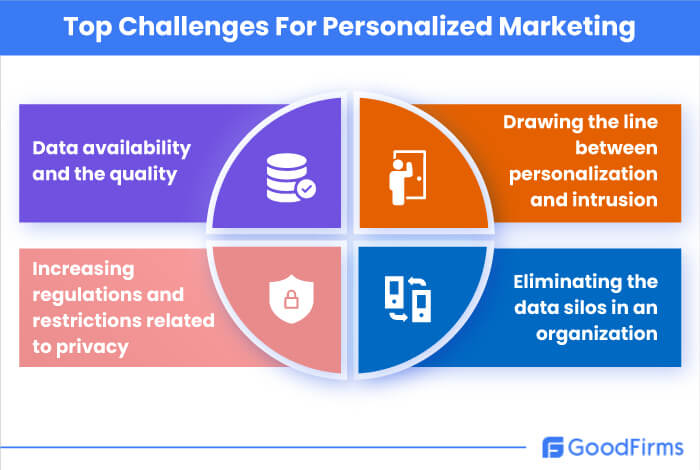
The Availability & Quality of Data
There is no denying the fact that data is one of the most important assets for any organization. That is also the primary challenge of personalized marketing. The availability of data or collecting data from various sources has become a challenge for businesses due to multiple factors.
The CEO of Soundproofgeek, Dave Pearson, states the reason for businesses not being able to collect data. In his opinion, “The challenges faced in personalized marketing include difficulty in getting the data that would point you to behaviors and activities of internet users. This is what usually helps with personalized ads but with the increased use of privacy services like VPNs, it's more difficult to get a hold of such data.”
Once the brand gets hold of some data of their customers, issues with the quality or accuracy of the data arise. The errors in data can be due to multiple reasons. It can be either due to the fact that data is collected from multiple sources or due to data silos within the organization. Marketing experts surely recognize the negative impact of inaccurate data.
For Anna Pozniak, a Marketing Manager, at NetHunt CRM, the biggest scare in a marketing campaign is inaccurate data as it can leave a negative impression among the customers. Anna says, “Data accuracy is the first thing that marketers need to think about. There can be nothing worse than sending a personalized offer with the wrong recipient's name on it. Or perhaps the recipient does not work anymore for the company, and your offer is not relevant anymore.”
Lack of quality data ultimately affects the quality of the campaigns.
The Line Between Personalization & Intrusion
There is a fine line between personalized offers and being outright creepy. Even though customers appreciate personalized offers and communication, there is only so much personalization that a brand should do. According to marketing experts, another challenge with this type of marketing is drawing the line between personalization and intrusion. A significant number of adults have reported being annoyed and shocked at the same time about how companies are using their personal data to show targeted advertisements.
The feeling of annoyance with personalization increases, even more, when brands use a piece of information to sell their products/services that the customers didn’t willingly provide to them. Marketing experts also clarify that insensitive, aggressive, or inaccurate personalization can also become a cause for customers to feel irritated with a brand’s marketing efforts.
Karl Robinson from Logicata shares the primary drawback of too much personalization. He states, “Personalized targeted marketing can sometimes become annoying and it is important to carefully consider how much you want to target someone as if you cross the line into annoyance you will be more likely losing consumers.” Karl is the Director & Co-Founder.
Actionable Insights for Personalized Marketing
The benefits of personalized marketing attract marketers to implement it, but at the same time challenges make it difficult for them to achieve their goal. To get results from personalized marketing campaigns, marketers need to make efforts in the right direction. Some top tips from experts are to identify the pain points of customers, map their journey, gather useful data to leverage it, and interact with the target audience.
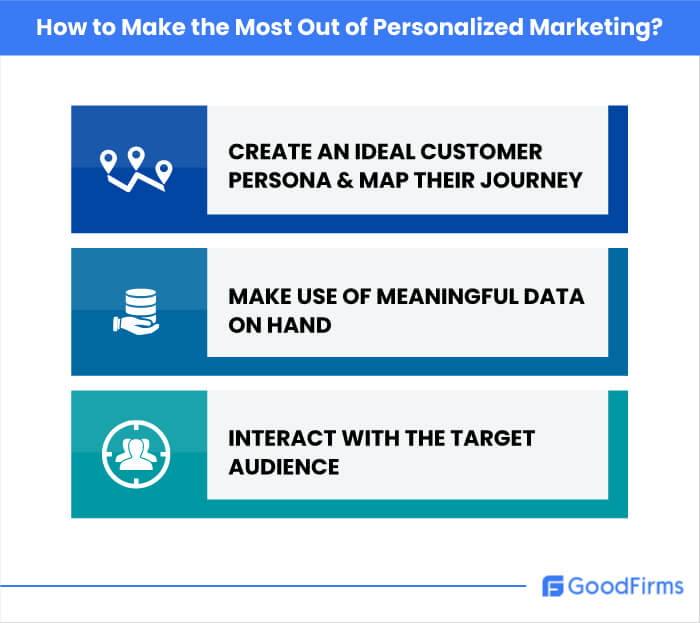
Create Ideal Customer Personas & Map their Journey
The best way to do personalized marketing is to know the potential customers, understand their problems, and identify the touchpoints in their journey from being a visitor on the site to becoming a customer.
Caleb Riutta is of the opinion that brands should know the problem areas of the customers and how their products/services will be able to solve them. This knowledge will help them create the appropriate content for the campaign. In his viewpoint, “The best tip I can provide for personalized marketing is to start by building a customer profile. Once you know what your customer's pain points are and their general purchasing behavior is to start tracking your users.” Caleb is the CEO of Dusk Digital.
The customer journey is all about converting them from a lead to a long-term customer for the business. The Founder of Smart Girl Digital, Katie Childers, recommends identifying the connection points with the audience in their journey through the customer acquisition funnel. That will give brands the sales they need.
In Katie’s words, “By mapping your ideal customer's journey, you will start to understand where the key moments of engagement can happen to help move a prospect to a paying customer, you can find ways to create a more personalized experience for your audience. Connecting with your audience at the moments that matter along their journey with you in a personalized and meaningful way builds the know, like, and trust factor with you and your brand”.
Use Meaningful Data
Brands use personalization in marketing to make their audience feel heard which will ultimately result in them becoming loyal customers. A brand can create individualized content depending on the platform it will be published on. The marketing experts give a preview of how to personalize the content.
The Digital Marketing Manager of World Climate Foundation Derrick Sullivan, tells the tricks which will help a brand to ensure that their marketing efforts are getting the required attention from the audience. He says, “A useful strategy that I use in email marketing is to include a first name field in the subject line, preview text, and the content of the email. This tends to make a noticeable impact in one's open rates and click-through rates”.
Bruce Hogan, the CEO of SoftwarePundit, gives another tip to customize the email content for the audience. He suggests crafting emails that show a customer’s journey with the brand.
Bruce said, “Personalized Year in Review Emails - Companies can create personalized summaries of each customer's interaction with the business for the previous quarter or year. For e-commerce companies, this could include products purchased, the amount spent, customer support tickets handled, and a personalized thank you note.”
Interact with Your Audience
Use social media for its original purpose. A brand should interact with its audience on social media in whatever manner they think is appropriate. The primary reason being interacting on social media makes the audience feel heard. The customers feel that the brand is recognizing and responding to every comment good or bad.
Hosea Chang is in favor of using social media to interact with potential/existing customers. The Chief Operating Officer at Hayden Girls mentions a few ways, “You can message users, reply to their comments, like their comments, ask for feedback, etc. This is its own type of marketing, as it appeals to the connection with the user and establishes the trust and relatability factor.”
There are do’s and don’ts for social media too. A brand needs to be aware of how to respond to different types of comments/reactions by the customers. If a situation is not handled properly, it can soon escalate into something unpredictable. Ferial Reynolds gives some tips and tricks to manage a brand’s social media page.
Ferial says, “Direct messaging & commenting on people is important. DM everyone who follows your business, DM people who watch your stories, like your posts. Commenting individualized comments on your tribes’ posts can start conversations and interactions with people. Also, replying to comments is non-negotiable.”
Best Platform For Personalized Marketing
A brand’s personalized marketing efforts will pay off only if it is done using the right platforms. Marketing experts have voted Emails as the best platform for individualized marketing campaigns. Social media platforms, without a doubt, are the second preferred platform for connecting with the target audience.
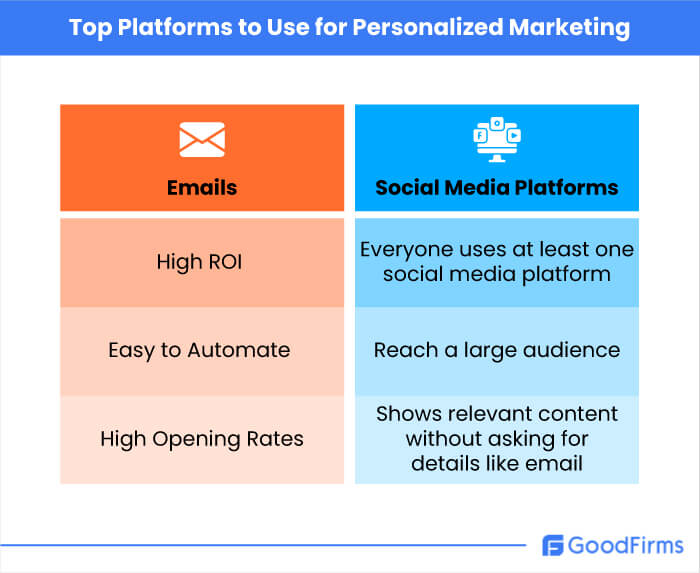
Emails
Emails have become a part of people’s everyday lives. Initially, emails were just another form of communication. Now, starting from social media accounts to bank accounts, everything is connected with emails. Due to their ever-growing importance, emails are the best platform for personalized marketing activities.
The Managing Director at Content Hive, Lisa Bourke, points out multiple ways in which a brand can use emails to have a successful marketing campaign and generate sales. Lisa said, “Email marketing offers one of the strongest returns on investment possibilities for personalized marketing efforts, as it can provide many different angles. It’s a wonderful method for recapturing abandoned carts or checkouts, offering discounts for loyal returning customers, and advising clients on new products or services based on their previous purchases.”
The next expert in favor of emails is Derrick Sullivan from World Climate Foundation Ltd. The Digital Marketing Manager gives reasons for Emails being his favorite platform. He says, “My favorite channel, by far, to practice personalized marketing is via email. With email, it is easy to automate and create customized customer journeys that take prospects through the sales funnel in a personalized way.”
When a brand invests in marketing campaigns, it expects some sort of returns or acknowledgment that the message reached the target audience. This is exactly what emails provide. According to Kimberly Smith, Marketing Manager at Clarify Capital, emails have a proven track record of their performance.
Kimberly says, “Email continues to come out on top as far as personalized marketing because consumers are more likely, on average, to attend to targeted messages via email than other platforms. An email has consistently high open rates, which means consumers are likely to engage with personalized content sent through this medium.”
Social Media Platforms
People of all age groups use some or the other social media platforms. A brand needs to identify the social media platform that it’s target audience is active on. For instance, Facebook is a platform that people of all ages and backgrounds use. On the other hand, Instagram users are mostly millennials and Gen Z.
The primary reason for a brand to use social media platforms is that it can reach a larger audience. Moreover, with the help of analytics, they can get the details of how their marketing campaigns performed and which audience liked what. All this information will play a crucial role in crafting more successful marketing campaigns.
Sachin Yadav, the Founder of Technologers.com precisely explains the reason for brands to use social media platforms for their personalized marketing campaigns. He says, “You must target audiences through social media platforms like Facebook, and Instagram. Not to mention, today's audience spend most of their time on these platforms. You see what they love, how they shop, and their needs and accordingly divert their attention towards your brand.”
Conclusion
Personalized marketing is everywhere. Whatever a platform a person uses, they see recommendations/offers based on their previous searches. There are multiple reasons for a brand to opt for tailor-made marketing. One of the most important reasons being it can increase the conversion rate and sales of the business. However, for carrying out such a marketing campaign, a brand may need some assistance. Brands can choose from the best content marketing companies to create an unmatched campaign.
Personalized marketing has a high success rate but it comes with its own set of challenges too. Data availability being the most important one. But there are always tools to gather accurate and high-quality data. There are some expert recommendations to get the best out of the marketing campaign. For instance, brands should leverage the quality data that they have at hand, understand the customer journey, and their pain points to offer a valuable experience. For brands just starting out with personalized marketing, emails are the best platform to reach the target audience.





